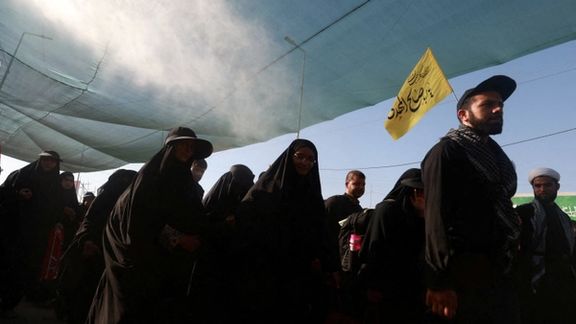Over a million cross from Iran to Iraq in controversial pilgrimage

The annual 'Arbaeen Walk,' a significant Shiite pilgrimage to Iraq for the Arbaeen ceremony, has commenced, with over a million pilgrims crossing the border from Iran.

The annual 'Arbaeen Walk,' a significant Shiite pilgrimage to Iraq for the Arbaeen ceremony, has commenced, with over a million pilgrims crossing the border from Iran.
Arbaeen marks the end of a 40-day mourning period following Ashura, the religious observance that commemorates the killing of Imam Hossein, the grandson of Prophet Mohammad, in 680 AD.
Majid Mirahmadi, the director of Iran's Central Headquarters of Arbaeen, announced Thursday that more than 1.5 million Iranian and foreign pilgrims have departed the country through six border crossings with Iraq.
He further emphasized that over 2.6 million Iranians have registered for the pilgrimage, typically attracting up to 20 million Shia Muslims from Iran, Iraq and elsewhere annually.
Iran’s clerical establishment is founded on a religious ideology that venerates Ali, the fourth Caliph after Prophet Mohammad, and his son Hossein as the rightful successors to Mohammad as leaders of Muslims. Consequently, religious symbolism is deeply interwoven with the political fabric of the Islamic Republic.
The Shiite leadership places significant emphasis on Ashura and other religious observances as pivotal moments for mobilizing public support and reinforcing its political authority through various ceremonies.
The "Arbaeen walk," while now a prominent event, is acknowledged even by Iran's hardliners as a phenomenon that has only gained significant momentum in the past decade rather than being rooted deeply in history.
Iran's Supreme Leader Ali Khamenei has placed considerable emphasis on Arbaeen, describing it as "beyond description, utterly unparalleled," and a "vast and astonishing demonstration of unity" with no equivalent worldwide.
He has criticized Western observers who often fail to comprehend this event's significance, leading their media to maintain years of silence—a calculated "conspiracy of silence."
“Not only in our era but throughout history, there is no record of a gathering like this [the Arbaeen procession], where such an event occurs annually, each year with even greater zeal than the last; it is truly unparalleled,” Khamenei said during a speech in 2019.
In the years following the fall of Saddam Hussein's regime, and particularly after the rise of ISIS, which precipitated Iran's intervention in Iraq, the Islamic Republic has meticulously orchestrated efforts to maximize participation in this ceremony, which many say never existed in history.
Observers note that Tehran leverages this strategy as a means to project the influence of the Shia-led Islamic Republic within Iraq, serving political objectives.
The head of the Central Arbaeen Committee announced in July that 12 trillion tomans (approximately $230 million) had been allocated to facilitate the Arbaeen pilgrimage.
Meanwhile, amid an economy crippled by sanctions and mismanagement, Iran faces severe budget constraints, with one-third of its population living in "extreme poverty."
Additionally, newly appointed Vice President Mohammadreza Aref authorized the allocation of 4 trillion rials (approximately $760k) to support the event, which will culminate in ceremonies in the Iraqi cities of Karbala and Najaf in late August.
The funds are earmarked to "mitigate unforeseen incidents, prevent the spread of contagious diseases, and address heat-related health risks at border crossings and along the pilgrimage route." But this is just a negligible part of what Iran spends in feeding, transporting and supporting the pilgrims. Although there are no official figures, it is estimated that the government spends at least $500 million annually.
This is while one of the most pressing crises currently facing Iran—an escalating electricity shortage that is crippling businesses and homes during an intense heatwave—the CEO of the Kermanshah Province Electricity Distribution Company announced that the electricity supply for Arbaeen pilgrims in the province has been secured, with 90 billion rials (approximately $172k) allocated to ensure reliable lighting along the pilgrimage routes and at related facilities.
These decisions have intensified public criticism of the Iranian authorities, with many questioning their decisions and priorities and arguing that these challenges further exacerbate the nation's already dire circumstances.